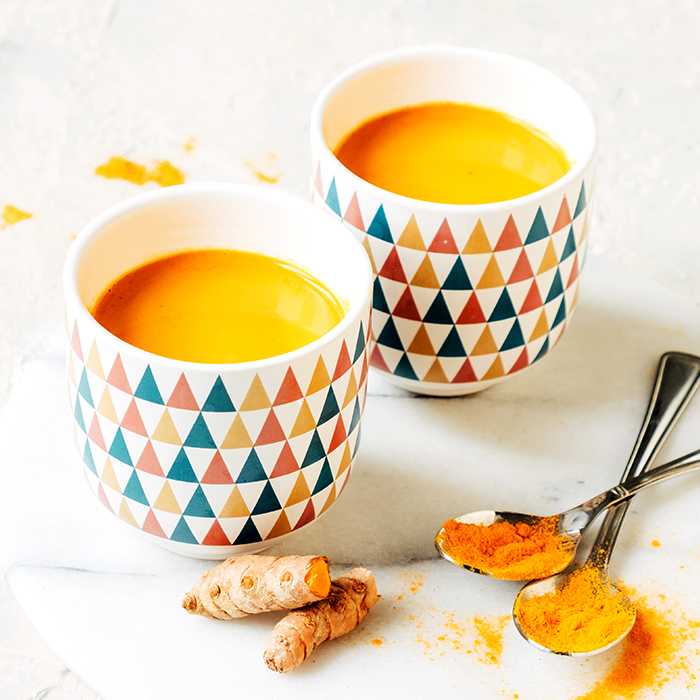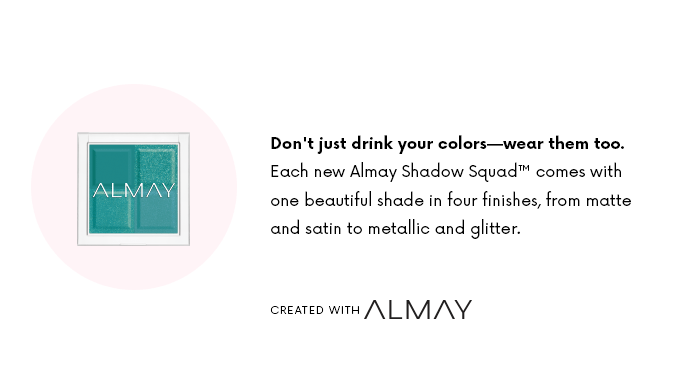Are Those Rainbow-Colored Lattes Actually Healthy?

Call it a casualty of what will soon be known as the Inexplicable Unicorn Mania of 2017: Even our lattes are no longer safe. Much like there are now entire restaurants devoted to Millennial Pink, there are few things along the cultural axis that haven't been blanketed in rainbow and glitter—and that includes a Starbucks Frappuccino.
But while such brightly colored drinks (or foods) might make for some solid Instagram fodder, their health ratings are often less than stellar. "While the Unicorn Frappuccino does contain spirulina to help give it the blue color, it also is full of harmful processed sugars (59 grams to be exact, way more than what you should have in a day, let alone one sitting), preservatives, and chemicals," notes Meryl Pritchard, nutrition expert and founder of Kore Kitchen. That's not to mention that the colorful aesthetic often comes courtesy of an array of artificial dyes.
The easy solution is just to keep an eye on ingredient labels, says Pritchard—but if you're up for it, you can also create your own decidedly healthier take on the trend at home. Better yet: When you're the barista, you have the opportunity to add in any nutrition-boosting ingredients as you see fit.
"I am personally a fan of caffeine-free 'lattes,'" says Pritchard. "I use Sun Potion's adaptogenic and Chinese herbs, gynostemma or dandelion tea as the base, a fat like coconut oil or ghee, and if I use a sweetener, it's always honey. Sometimes I will also add marine collagen powder by Vital Proteins ($49), or coconut creamer by Laird Hamilton's new superfood company which will give it a little more foam. I add hot water and blend everything in my Vitamix and it feels like I'm drinking coffee but instead of getting a caffeine buzz and crash, you get a natural and sustained high for the whole day!"
As for the (natural) color you'd like to add to your DIY latte, there are a few options. Keep reading to learn how to give your drink a technicolor boost.
Turmeric
"A turmeric latte or 'golden latte' is beautifully Instagrammable and also really healthy," says Pritchard. "It usually contains other natural spices, a nut milk, coconut oil, black pepper oil, and honey as the sweetener." As for the spice the drink is named for, turmeric's health benefits are well-documented: Studies show that it's a potent antioxidant and anti-inflammatory and can help aid with digestive issues. (Some research even suggests that turmeric has anti-cancer effects.)
Hibiscus
Hibiscus tea lends a deep red color and a tart, cranberry-esque flavor—and it's just as delicious hot as it is cold. Better yet: Research shows that hibiscus flowers can help reduce blood pressure, and it's also an effective remedy for a dry or sore throat.

Beet
Pritchard also recommends creating a beet infusion if you're looking for a scarlet hue. Beets are high in folate, anthocyanins, and lycopene, which means they're great for muscle recovery after a tough workout (and offer your immune system a boost, too). (FWIW, this dairy-free beet latte recipe looks delicious.)
Matcha
No surprises here: This superfood trend has staying power for a reason. Not only does matcha offer a potent caffeine boost without the same jittery feeling as coffee, but it's also packed with antioxidants—which translates to less inflammation, more focus, a boosted metabolism, and even clearer skin. Try one of these three easy recipes to incorporate matcha into your routine.
Spirulina
If you're aiming for a gorgeous blue-green hue, you might consider adding a pinch of spirulina. Don't let the fact that it's a sea algae turn your stomach, because it's that good for you: Just a teaspoon of spirulina powder is packed with protein and B-12 vitamins, and can give your heart and immune system a boost. (And there's no detectable fishy taste—promise.)
Next up: This is why you should never drink coffee on an empty stomach.
This article is provided for informational purposes only and is not intended to be used in the place of advice of your physician or other medical professionals. You should always consult with your doctor or healthcare provider first with any health-related questions.



